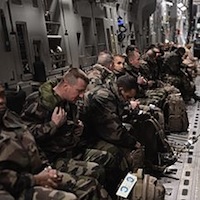 The Economist ran what I believe to be a fairly reasonable editorial on the French & African-led UN interventions in Mali. They argue that the intervention should be limited to driving the jihadist groups out of the northern cities (but not getting dragged into a quagmire by trying in vain to stomp out an insurgency in the semi-desert “wastelands” through force) and to stabilizing the interim government in the south and freeing it from the shadow of the military officials who overthrew the elected government last spring.
The Economist ran what I believe to be a fairly reasonable editorial on the French & African-led UN interventions in Mali. They argue that the intervention should be limited to driving the jihadist groups out of the northern cities (but not getting dragged into a quagmire by trying in vain to stomp out an insurgency in the semi-desert “wastelands” through force) and to stabilizing the interim government in the south and freeing it from the shadow of the military officials who overthrew the elected government last spring.
If the Islamist rebels are prevented from seizing the south and forced out of the northern cities, and if serious efforts are made to improve governance (and hopefully provide economic redress to longtime northern grievances that allowed a window for the jihadists to outflank the secular rebels), then Mali will be on a safer footing and the West will be less fearful of it becoming a terrorist safe-haven in West Africa, which in turn means less future interference. The total incompetence and lust for power of the Malian Army is largely to blame for the current situation and the need for an intervention; had the Army not tried to overthrow a twenty-year-old democracy during a tantrum over their own inability to beat back a poorly organized rebellion despite American counterinsurgency training and funding, the northern rebels (first secular, then Islamist) would not have been able to take sweeping control over extensive territory, and the Islamist threat would have been more imagined than real. That said, the United States and the other Western powers should never have let the situation get this far by ignoring the poverty and real tensions that provoked the latest of many northern rebellions, and they should not have relied so heavily on a southern government that was unprepared for any real military response let alone a multifaceted engagement strategy to prevent rebellion at all.
In the future, I hope we consider providing more humanitarian aid to the region, but I fear the rise of the real Islamists there will preclude that even more so now than when the alleged Islamists who were actually secular separatists were the dominant regional faction against the government. During the Cold War, we used the Marshall Plan to rapidly alleviate poverty and strengthen moderate socialist and Social Democratic parties in Western and Central Europe — to prevent the spread of communism — by providing humanitarian aid and institution-building aid in the aftermath of World War II. The Soviets tried to do the same in reverse, but this was trickier for them given their own economic problems. Islamic political parties in Africa, the Middle East, and Central Asia have built supporter networks rapidly in impoverish regions not with talk of waging war on infidels but by providing humanitarian services, non-governmental shadow institutions, and jobs to people who are ignored, unemployed, and hungry. In Europe, we were willing to buy out reasonable Socialists and their constituents to halt the spread of communism and advertise American/capitalist economic benefits. Instead of replicating this extremely successful policy in the Middle East and Africa, we have opted nine times out of ten to isolate, ignore, or repress political Islam, even when it is relatively moderate, yet we do not offer any comparable alternative humanitarian aid, institutional aid, or employment, let alone offer any loyalty buyouts of these parties.
Ultimately, I suppose the Western powers pay for this strategy choice in lost troops, terrorist attacks, and fighter planes that cost far more (and do so for a longer period) than aid and investments would. It’s also too bad that voters don’t see the merits and payoff of an alternative strategy and keep saying they want to reduce foreign aid even further. But at the end of the day, we need our leaders to lead, advocate, and educate the public. That’s something most of them just aren’t doing.



 The Economist ran what I believe to be
The Economist ran what I believe to be